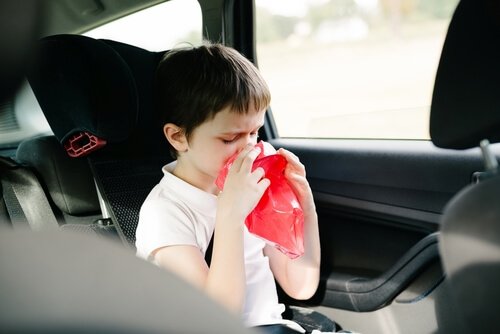Why Do Children Throw Up for No Apparent Reason?

As mothers, our children’s health is our top priority. When they’re feeling under the weather, we do whatever’s possible to reverse the situation. One of the things that often causes us to worry is when our children throw up for no apparent reason. Before we even realize it, our children can quickly become dehydrated.
Whenever our children start to vomit, the first thing we do is check for the most obvious or common causes. However, if none of these causes seem to be to blame, and the vomiting continues, we begin to worry.
The first thing we ask ourselves when our children throw up is if they ate something that might have upset their stomach. But if our kids keep throwing up and there’s no explanation, we wonder what’s bringing on this unexplained symptom.
Why does vomiting occur?
It’s important to understand that vomiting refers to the rapid, violent expulsion from the stomach out of the oral cavity. However, if what you observe is a milder expulsion of stomach content to the mouth, then you’re dealing with regurgitation. Regurgitation is common in small babies.
In general, vomiting has to do with an illness and frequently involves additional symptoms (fever, abdominal pain, etc). However, if children throw up for no apparent reason, then you may be observing the presence of psychogenic vomiting.

Psychogenic vomiting is a type of vomiting that is intensely related to psychological or emotional causes. This can be very common in children.
In cases of psychogenic vomiting, the symptoms fall into one of the following categories:
- Intentional psychogenic vomiting: Children consciously provoke their own vomiting, as occurs with individuals who suffer from bulimia nervosa. In other words, it’s an episode of induced vomiting.
- Unintentional psychogenic vomiting: Vomiting is brought on by nervousness, excessive anxiety or stress.
These are the most frequent cases in children, especially when they require attention. When psychogenic vomiting appears constantly, it can be very difficult for specialists to indicate treatment. Finding the cause behind the symptoms can be very difficult, especially when children are very young.
When children throw up for no reason: possible causes
1. Anxiety
If you have a child that tends to worry, or becomes easily frustrated, then your child may be anxious.
Children who experience anxiety have a hard time staying calm in stressful situations. They tend to present physical manifestations of their anxiety, such as episodes of vomiting.
2. Emotional changes
On the other hand, your child’s psychogenic vomiting may be the result of major changes in his or her life. These may include divorce, a fight, moving, loss of a loved on, etc. Vomiting is a way of getting out the emotions children are feeling but don’t know how to express .
“If your child is throwing up for no apparent reason, then you may be observing the presence of psychogenic vomiting.”
3. Anger
This is another demonstration of children’s emotions. It may be due to the frustration that children feel for not getting what they want.
Vomiting may then be a method used to manipulate. In other words, children learn that vomiting is an effective tool for getting their way.
A clear example is when children are upset because their parents won’t give them what they want. When crying doesn’t work, they become angry and cry even harder, which leads to vomiting.
When children throw up, they capture their parents’ attention. As as result, some children learn that throwing up is a way to get what they want.

What can parents do if their children present psychogenic vomiting?
The first thing you should do if your child is throwing up is to stay calm. Vomiting is common in children and we shouldn’t overreact. This may only make your child more anxious.
If your child throws up, you should first seek attention from a medical professional.
However, if your pediatrician can’t find any physical or organic cause, you should look for a child psychologist. This professional will evaluate your child and provide you with the best solution.
All cited sources were thoroughly reviewed by our team to ensure their quality, reliability, currency, and validity. The bibliography of this article was considered reliable and of academic or scientific accuracy.
- Allen K. The vomiting child–what to do and when to consult. Aust Fam Physician. 2007 Sep;36(9):684-7.
- Comberiati P, Cipriani F, Schwarz A, Posa D, Host C, Peroni DG. Diagnosis and treatment of pediatric food allergy: an update. Ital J Pediatr. 2015 Feb 19;41:13.
- Chiu A, Falk A, Walkup JT. Anxiety Disorders Among Children and Adolescents. Focus (Am Psychiatr Publ). 2016 Jan;14(1):26-33.
- Elghoudi A, Narchi H. Food allergy in children-the current status and the way forward. World J Clin Pediatr. 2022 May 9;11(3):253-269.
- Elliott EJ. Acute gastroenteritis in children. BMJ. 2007 Jan 6;334(7583):35-40.
- Raucci U, Borrelli O, Di Nardo G, Tambucci R, Pavone P, Salvatore S, Baldassarre ME, Cordelli DM, Falsaperla R, Felici E, Ferilli MAN, Grosso S, Mallardo S, Martinelli D, Quitadamo P, Pensabene L, Romano C, Savasta S, Spalice A, Strisciuglio C, Suppiej A, Valeriani M, Zenzeri L, Verrotti A, Staiano A, Villa MP, Ruggieri M, Striano P, Parisi P. Cyclic Vomiting Syndrome in Children. Front Neurol. 2020 Nov 2;11:583425.
- Rivera-Dominguez G, Ward R. Pediatric Gastroenteritis. Treasure Island (FL): StatPearls Publishing; 2022 Jan-.
- Saikia D, Sharma RK, Janardhan KV. Clinical profile of poisoning due to various poisons in children of age 0-12 years. J Family Med Prim Care. 2020 May 31;9(5):2291-2296.
- Soave PM, Curatola A, Ferretti S, Raitano V, Conti G, Gatto A, Chiaretti A. Acute poisoning in children admitted to pediatric emergency department: a five-years retrospective analysis. Acta Biomed. 2022 Mar 14;93(1):e2022004.
- Zhong W, Shahbaz O, Teskey G, Beever A, Kachour N, Venketaraman V, Darmani NA. Mechanisms of Nausea and Vomiting: Current Knowledge and Recent Advances in Intracellular Emetic Signaling Systems. Int J Mol Sci. 2021 May 28;22(11):5797.
